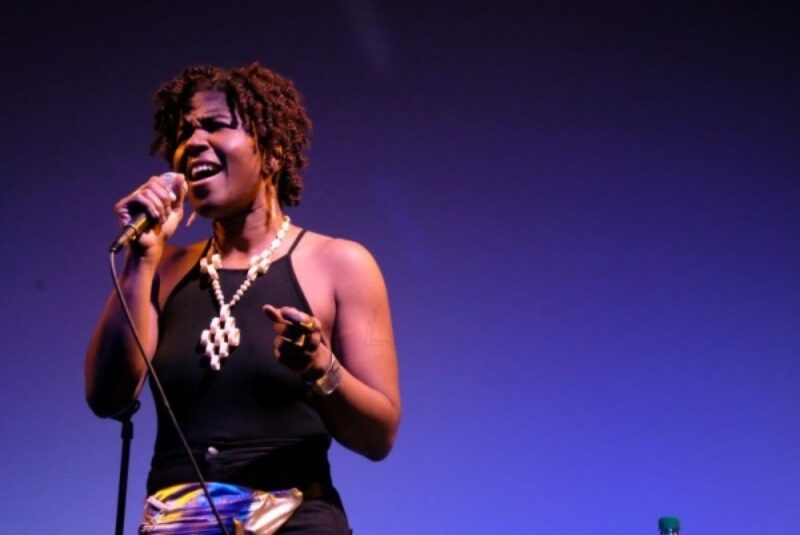Bugging Out at Hugo House
Written by TeenTix Newsroom Writer Tova Gaster, and edited by Teen Editor Huma Ali!

Since everything is in a constant state of change, a huge variety of media can be shoehorned into the theme of “Metamorphosis”. This theme was stretched to its artistic breaking point at the Hugo House’s Literary Series, an evening of readings by acclaimed authors Benjamin Percy, Vanessa Hua, and Keetje Kuipers, as well as a musical performance by vocalist-producer-composer-improviser-goddess Sassyblack.
The Hugo House’s Metamorphosis literary series event specifically referred to Franz Kafka’s iconic story of the same name, in which a man is inexplicably transformed into a hideous beetle. Beyond the mutable theme of change and transformation, an insectoid motif crawled throughout several of the pieces. From author Benjamin Percy’s tale of a girl haunted by cockroaches and smoke, to Sassyblack’s repetition of “straight buggin-out” over spacey recorded beats, this reading was not an event for entomophobes—google search: person who fears insects.

Keetje Kuipers at the Hugo House's Literary Series. Photo by Paulette Perhach.
Poet Keetje Kuipers, (pronounced Kay-tcha Ky-pers), interpreted Metamorphosis through the lense of her sexual identity: her transformation from “a twenty year-old straight woman to a thirty-something lesbian.”
The poem that communicated this transition most directly, and left the strongest impression, described burning a woodpile of all the dicks she’d ever seen or touched. This wasn’t necessarily accompanied by a strong sense of malice or triumph—it felt more like a frank and darkly funny acceptance of her indifference to cis men. However, the metaphor equating penises to straight relationships struck an off chord, neglecting trans identities for the sake of a provocative metaphor. This is clearly an oversight born of Kuipers speaking purely from her own experience, but it still conveys a conception of gender that alienates trans and genderqueer audiences.
In another poem, Kuipers imagined herself as a vulture, a bird of prey which spits half-digested carrion at perceived threats as a defense mechanism (actual nature fact!). This poem was a response to misogyny from a surgeon, who, standing over her on the operating table, commented on her naked body before putting her under for operation. That experience of objectification and invasion, of being reduced from a complex human to a desirable or undesirable body, is an extreme example of entitlement towards women’s bodies normalized under the patriarchy. That objectification can breed anger and disgust directed both outwards at the source, and internalized as self-hatred or shame (like ingested carrion, rotting and corrosive).
Her poems deal heavily with the physical experience of existing in a body gendered by society as female, with all the baggage that entails. However, Kuiper’s subtle language communicates gender expression as a facet of her overall identity instead of as the entirety of her experience.

Vanessa Hua at the Hugo House's Literary Series. Photo by Paulette Perhach.
Author Vanessa Hua’s take on metamorphosis couldn’t have been more different: a short story exploring the cyclical path of manufactured goods from China to the United States and back again. In an ironic commentary on American charity, a young Chinese girl receives Christmas presents sent by American school children, only to discover the “made in China” label. She later immigrates to America herself in a metamorphosis which is implied, but which Hua chose not to delve into deeply. The story explored the weight of America as both an ideal and economic force in the mind of the protagonist and her community, an intriguing idea which I wish had been executed more completely—but Hua stated that this was an early draft.
I’m a dedicated fan of Sassyblack, (real name Catherine Harris-White), whose creative work fluidly blends composing, producing, singing, educating, and improvising. This last skill was put to the test when her laptop froze in the middle of her song, cutting off her stream of electronic rhythm. With five minutes left in her set, she seamlessly burst into an improvised comedy monologue about the importance of ghosting friends for the sake of a mental health break, and how, as she later wrote on her instagram: “this act of disappearance without notification can be jarring but necessary for the growth and metamorphosis of both parties involved.”
In any other hands, this would have been an awkward disaster. But Sassyblack’s humor and charisma pulled off a smooth set—even if it turned what was planned as a musical act into a fusion of stand-up comedy and motivational speaking.
The final performer of the night, Benjamin Percy, is a comics writer, and it shows. Descriptions conjured sketched lines and shaded panels, making his ghost story about a burnt-down house predictably spine-tingling.

Benjamin Percy at the Hugo House's Literary Series. Photo by Paulette Perhach.
Almost more significant than his writing was his voice: Percy has an exceptionally deep and grizzly-bear-ish voice; darkly resonant during the spooky passages, and transfixing when reading dialogue. His ominous intonation of the word “cheeto” sent titters through the audience. Several very icky scenes featured cockroaches, including insects mistaken for cereal and crunched in the mouth, providing a Kafka callback.
The readings on the whole were thought-provoking, despite the material clearly being a little rough around the edges: Kuipers was revealed to have been revising her work up until that afternoon, and tech trouble forced Sassyblack to think on her feet. This improvisation on the part of the artists was an unexpected feature of the night, but I appreciated the raw ideas articulated live in the authors’ own voices—clearly still in a state of metamorphosis.
The Teen Editorial Staff is made up of 5 teens who curate the review portion of the TeenTix blog and manage the TeenTix Newsroom. More information about the Teen Editorial Staff can be found HERE.
The TeenTix Press Corps promotes critical thinking, communication, and information literacy through criticism and journalism practice for teens. For more information about the Press Corps program see HERE.


